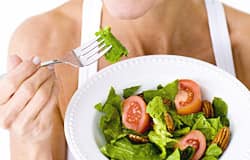- Science & Research
- Science News
- Newsletter
- 2011
- November 18

Newsletter
Newsletter
Stroke Risk Declines With Greater Number Of Healthy Lifestyle Factors
Stroke risk declines with greater number of healthy lifestyle factors
Friday, November 18, 2011. The November 14, 2011 issue of the Archives of Internal Medicine reports the outcome of a study which concluded that the greater number of healthy lifestyle factors one has, the more protection one gains against stroke. Stroke is a major cause of death worldwide, and its impact on survivors can be devastating. Gang Hu, MD, PhD of Pennington Biomedical Research Center in Baton Rouge, Louisiana and colleagues analyzed data from 17,287 men and 19,399 women without a history of heart disease or stroke who participated in surveys conducted in Finland in 1982, 1987, 1992, 1997 and 2002. Questionnaire responses provided information on medical history, physical activity levels, smoking habits, alcohol consumption, diet and other factors. Participants were followed through 2007, during which 1,167 ischemic strokes and 311 hemorrhagic strokes occurred. The five healthy lifestyle factors evaluated in the study included being a lifelong nonsmoker, having a body mass index of less than 25, engaging in moderate to high levels of physical activity, consuming vegetables at least three times per week and having light to moderate weekly intake of alcohol. Compared to the risk of stroke experienced by those having one or no healthy factors, having two, three, four and five factors was associated with a 34, 43, 49 and 67 percent adjusted reduction. When stroke was analyzed according to type, having two, three, four and five factors was associated with a 33, 40, 50 and 70 percent lower risk of ischemic stroke and a 37, 51, 51 and 60 percent decreased risk of hemorrhagic stroke. These inverse associations were present in both younger and older participations and among those with and without high blood pressure or a history of diabetes. "Our study demonstrates a graded inverse association between the number of healthy lifestyle factors and the risks of total, ischemic, and hemorrhagic stroke in both men and women," the authors conclude. "Our findings suggest the important role of promoting a healthy lifestyle in the primary prevention of both ischemic and hemorrhagic stroke." |
||||||||||||||||
 |
||||||||||||||||
|
||||||||||||||||
|
||||||||||||||||
 |
||||||||||||||||
|
||||||||||||||||
|
||||||||||||||||
†This supplement should be taken in conjunction with a healthy diet and regular exercise program. Results may vary
UC-II® is a registered trademark of InterHealth Nutraceuticals, Inc. U.S. Patent Nos. 5,645,851, 5,637,321, 5,529,786, 5,750,144, 7,083,820, EP1485906 B1 and worldwide patents pending. AprèsFlex™ is a trademark of Laila Nutraceuticals exclusively licensed to PL Thomas – Laila Nutra LLC. International patents pending.
The latest news on aging, nutrition, and vitamins
Lab
Testing
How Life Extension lab testing works









